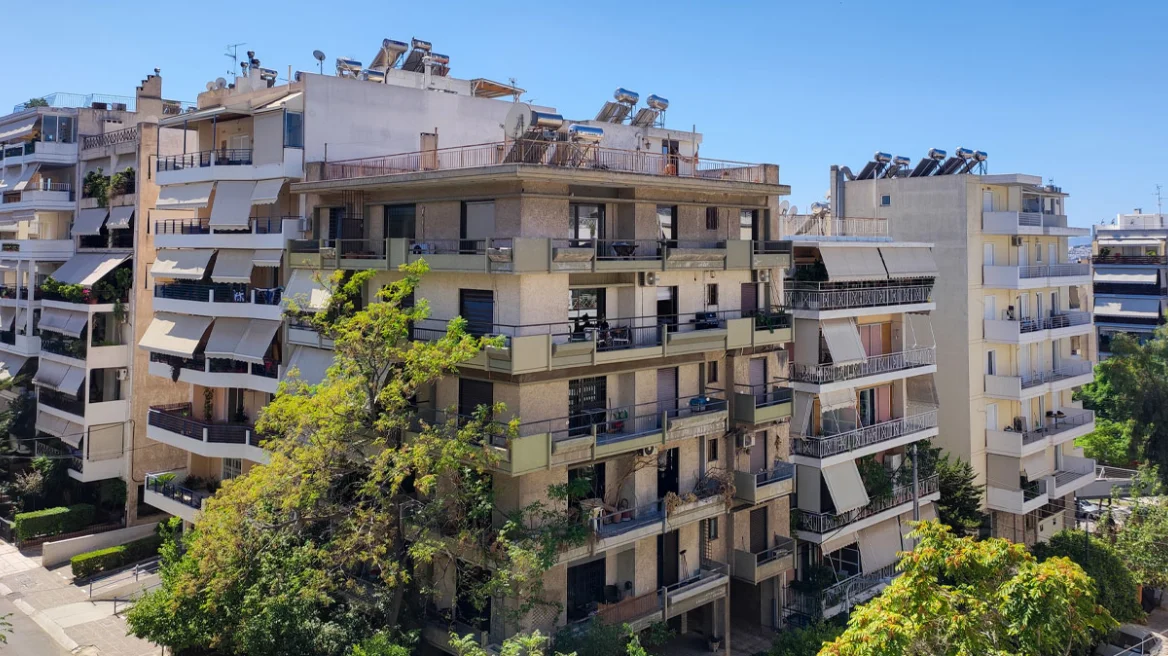Hello, so from the four-day weekend that just passed, we keep the relatively better weather than what we were told to expect and…we take courage because Easter is right next door, only three weeks left for new outings. Not to mention that where there’s Easter, summer is also near. Now that I mentioned summer, let me note that if everything goes well internationally, those involved in tourism in Greece—hoteliers, travel agents, etc.—are predicting a super year. Of course, these predictions always come from pre-bookings, but let’s also see how the…construction work in Syntagma progresses. Will they keep wrecking things while the authorities turn a blind eye?
Trump
Another thing we should take from these past days is the event held for March 25th at the White House, attended by Trump and the new ambassador Kimberly, and especially a truly warm speech by the president about Greece. This is the first comprehensive reference to us by POTUS with warm words, even for Mitsotakis himself, so it holds significance. Because, no matter how you look at it, as a country—and the government itself—we are trying to find our footing with the new Trump administration.
Afternoon meeting (post-scodalia)
Yesterday, after the parades and the traditional meals of the day, several M.M. officials headed down to the government headquarters (despite the scordalia they had eaten) to “lock in” the agenda for the cabinet meeting, where the top news will be the increase of the minimum wage to up to 880 euros (from 830 today). Under normal circumstances, the railway issues would also have been on the agenda, but the government decided to leave the topic out for now so that the wage announcement wouldn’t be overshadowed. After all, the new Deputy Minister of Transport, Kostas Kyranakis, who is in direct contact with Vice President Hatzidakis, is trying to speed up various pending issues. There is, however, the impression that a cabinet meeting will be held before Easter, where these matters will be included. Meanwhile, K.M. continues his visits to ministries—this morning, he will go to Migration and Asylum, and on Friday, he will visit Health.
Candidacies
Since yesterday we had parades and a lot of movement on the official stands, let me share some news about the candidacies brewing for the “blue” ballots, even though the elections are in 2027. Already, in the northern sector, Pavlos Marinakis is doing very well in rolling polls, while a potential shake-up could come from the scenario of Dimitris Kairidis moving to the European Migration Organization this summer. It is also rumored that former minister Vasilis Kontozamanis wants to run. In the southern sector, aside from ND spokesman Nikos Romanos, the candidacy of communications expert Thomas Varvitsiotis should be considered “locked in,” as well as that of former MEP Stelios Kymbouropoulos.
Zacharaki unites
There were various amusing moments in several parades across the country, but one of the most surreal scenes took place in Kalamata. Antonis Samaras was absent from the parade, and from the government’s side, Sofia Zacharaki attended, taking pictures and greeting people. She even managed to bring together at the same table the two other MPs of the region, Miltos Chrysomallis (a Samaras supporter) and Periklis Mantas (not a Samaras supporter), who barely speak to each other. The funniest part is that from Messinia also hails the new Deputy Minister of Citizen Protection and longtime political rival of Samaras, Giannis Lambropoulos, who, in his first parade as a minister, was marked “absent” due to a prior commitment in Athens.
The Livanios Evaluation
After Easter, the first emails regarding the evaluation of public services—designed by the Ministry of the Interior and Minister Theodoros Livanios—are expected to reach citizens. K.M. announced this the day before yesterday, but some technical details still need to be settled. Beyond that, there is a proposal on the table to send these emails twice a year, with a follow-up after six months, to maintain continuity in the feedback.
The “Blue” Parliamentary Group in Motion Again
The prevailing atmosphere of concern within the New Democracy parliamentary group is putting its MPs in motion. This concern, as they themselves describe it, is about the supposed further decline of the government in the polls—although, deep down, it may stem from their unspoken disappointment at not being included in the recent cabinet reshuffle. In any case, the impact on the government seems to be the same and is likely to manifest soon in two ways.
Question (I)
The first is through the submission of a parliamentary question. I hear that Maximos Mansion has received information that Evripidis Stylianidis is drafting the text, which, this time, will not be related to the economy and “red” loans, nor to the new Deputy Minister of Energy, Nikos Trafos, who has drawn criticism from ND MPs due to a past unfortunate remark about the Occupied Territories. Instead, the question will focus on foreign policy issues—though it is not yet clear (from Maximos) whether it will concern the Cyprus issue, the cable project, Greek-Turkish relations, or all of them together.
Vote (II)
The second “blow” might come during the parliamentary group meeting scheduled for April 4, where Apostolos Vesyropoulos is to be elected as the parliamentary secretary. The MPs are leaning towards requesting a prior discussion or at least setting up a ballot box for Vesyropoulos’ election, instead of proceeding with a voice vote. A ballot, because according to the party’s charter, the vote must be secret to ensure a more authentic representation of power dynamics.
When You Have the Upper Hand…
In mid-March, the largest international real estate exhibition, MIPIM, took place in Cannes, attended by the entire elite of Greek real estate. The event was inaugurated by Mario Draghi, and Greece was represented by Enterprise Greece, the Hellenic Corporation of Assets and Participations (HCAP), and major market players such as Prodea, Premia, Dimand, Orilina, Mitsis Group, DKG Development, Kourtidis Group, and others. Everyone did their best, but the one who stole the show effortlessly was Christoforos (Chris) Papachristoforou of Prodea, who arrived in Cannes by private jet. Rented, I assume…
A golden deal
The private equities regularly update the investors who contributed the funds on the progress of their placements. In the reporting sent by CVC, it states that regarding Ethniki Asfalistiki, the sale to Piraeus Bank was completed with a 3.2x multiplier of invested capital and 35% above the December valuation. It is also mentioned that Ethniki Asfalistiki was sold by CVC’s Fund VII, which is entitled to 15% of the funds transferred as interest.
The projects of Entelecheia
The construction company Entelecheia, which has been agreed to come under the control of AKTOR, has published its financial results for 2024, showing that net turnover amounted to 103 million euros (from 66 million euros in the previous fiscal year) and pre-tax profits to 37 million euros (from 16 million), with total liabilities of 46 million. Entelecheia, which is linked to the well-known Gantzoulas family in the industry, was converted from an IKE to an SA a month ago. As is known, it has already been agreed that 50.01% of the company will be acquired by AKTOR, which will utilize capital from its implemented share capital increase. The financial statements note that the finalization of the agreement is expected in the coming months. It is also mentioned that from 1/1/2025, Entelecheia has replaced INTRAKAT (AKTOR) as the contractor for DEDDIE projects worth 154 million euros in various regions (Trikala, Karditsa, Thebes, Livadia, Thessaloniki, Heraklion, etc.), which will be executed within a timeframe up to 31/8/2026. For all these projects, an 18-month extension has been signed, which may be accompanied by a 50% increase in scope. A 50% increase in scope has already been signed for the “NETWORKS OF TRIKALA & KARDITSA AREAS” project worth 11,200,000 euros and the “NETWORKS OF THEBES, LIVADIA & AMFISSA AREAS” project worth 10,920,000 euros.
After Easter for Qualco – Mercury retrograde
They wanted it earlier, but it didn’t happen, so the next stock market listing after the Fais Group (which is announcing the share allocation details today), namely Qualco of Orestis Tsakalotos, is scheduled to take place after Easter. Since we are on the subject of the stock market, I can’t say for sure because I only have some indications from my reporting, but I get the impression that… Mercury is retrograde for the President of the Athens Stock Exchange, the (I have you all written off) G. Kontopoulos. It may be a temporary coincidence that will be overcome in the near future…
The stock market chases a 15-year high
Investors are popping champagne at the stock market, which, fueled by Moody’s and upcoming upgrades, is now “chasing” the 15-year record of 1,745 points (August 2010). The banking index is within striking distance of 1,700 points, extending its more than nine-year high (November 2015). An 11-year record for the FTSE 25 – large-cap index, with the next target at 4,300 points and April 2014 levels. Meanwhile, the Mid Cap – mid-cap index reached 2,600 points for the first time since January 2010. The “takeoff” of the Athens Stock Exchange is gaining solid ground, and this is due to the fact that almost all blue-chip stocks are reaching record levels. Boosted by the deal with Fairfax and Prem Watsa’s increased stake in its share capital, Metlen hit a new all-time high, coming within a “breath” of 40 euros. PPC broke the 14-euro barrier, closing at a 15-year high (March 2010). Similarly, OPAP extended its 16-year record (June 2009) and closed at 18.4 euros. Coca-Cola HBC recorded a new all-time high at 41.74 euros. Bank stocks are also on a record trajectory, with Alpha Bank closing at its highest level since June 2016 and Piraeus Bank since April 2021. The Athens International Airport equaled its all-time high of 9.2 euros. Finally, GEK TERNA climbed back above 19 euros, paving the way for 25-year peaks (February 2000).
Record 16-17 years in the average daily transaction value
The national anniversary thus found, as we said, the General Index of the Athens Stock Exchange at the levels of… August 2010, just before the dark period of the harsh memorandum years began. It was also the international anniversary of 25 years since the bursting of the dot.com bubble in New York, when the American Central Banker Greenspan spoke of “Irrational exuberance,” the “irrational euphoria” of the stock markets. From March 24, 2000, onwards, all major stock markets (and not just Athens’ Sofokleous) plunged from the clouds of digital expectations into the abyss of harsh reality. The Nasdaq lost 80% of its value, in Germany the notorious Neuer Markt literally disappeared, and so on. Then came the terrorist attack of September 11, 2001, the major accounting scandals such as the one that led to the collapse of Enron Corp., and many more. Today, the Nasdaq has quadrupled its value compared to 25 years ago, at 18,885 points, while the DAX is soaring at historic high levels of 23,115 points. In America today, we observe the following interesting element: the S&P 500 index and the dollar index have declined by -6.5% and -3.5%, respectively, since January 31. The last time stocks and the dollar fell simultaneously with a move of this magnitude was in 2008. During the period from December 2007 to March 2008, the S&P 500 index and the U.S. dollar index decreased by -10.2% and -5.4%, respectively. In Athens, the General Index is far from the historical high level of 6,335 points, but it has reached 1,726 points, and the average daily transaction value last week was 282.33 million euros, which is a 16-17 year record for the Greek market. The market capitalization exceeds 120 billion euros, and the General Index stands out in Europe with a return of more than 16%, while the Banking Index offers almost double the return since the beginning of the year…
The Bank of Greece and the auction hammer
Let’s now turn to auctions, with an admittedly unusual one scheduled for today, Wednesday, March 26. The somewhat strange thing is that the party initiating the auction is not a servicer company or a commercial bank, as usual, but the… Bank of Greece. The procedure is directed against two individuals, and a 366 sq.m. plot of land located within the city of Gythio, in the Neapolis district, is expected to go under the hammer, “along with the old two-story residence and an unfinished building with a constructed load-bearing structure of reinforced concrete and a partially tiled roof under a building permit (from 1995) issued by the urban planning office of Gythio, as well as all buildings, existing and future, annexes, appurtenances, extensions, sheds, installations, and components thereof,” as specifically stated. During the on-site inspection (and according to the relevant appraisal report), an old two-story tiled-roof house, predating 1955, exists within the plot. Its dimensions are approximately 35 sq.m. per floor, totaling 70 sq.m., and its external maintenance is average. This old house is adjacent to the unfinished three-story building. The unfinished three-story building has a total area of 256.61 sq.m., covers a plot area of 103.50 sq.m., has a height of 9 meters + 1.50 meters for the roof, and, based on the permit, is legally designated for residential use, with a constructed load-bearing structure of reinforced concrete, while part of the tiled roof exists (the rest has collapsed). The progress of construction is estimated at 25% compared to a completed building. Furthermore, it is noted that access to the property’s location is difficult and is only possible on foot via municipal stairways and narrow alleys. The starting bid price is 113,000 euros, and it should be emphasized that this is a repeated auction, as the first one, held on January 17, 2024, was unsuccessful due to a lack of bidders. Now, how did the Bank of Greece end up involved with electronic auctions? According to the auction document, there has been a mortgage for an amount of 44,020.54 euros against the two individuals for a decade, with the lender being the Bank of Greece, a precautionary seizure for 35 million drachmas in a period prior to the euro, and a compulsory seizure for an amount of 127,594.72 euros in June 2023, always in favor of the Bank of Greece. These things happen…
The Mevaco and Intracom Defence agreement
Now that Europe is directing its public spending towards the defense industry, small overlooked companies are finding the opportunity to stand out. One of these is the Athens Stock Exchange-listed Mevaco, which is valued at just 43 million euros. Small capitalization, low liquidity, but new major projects are emerging in the defense sector. A few days ago, Mevaco signed an agreement to manufacture metal parts for defense systems on behalf of “Intracom Defence,” with an export orientation. The stock market price of Mevaco has barely increased by +3% since the beginning of the year, and this is due to the fact that it has very limited trading activity, making it difficult for investors to find shares to buy.
Eighteen Data Centers announced (so far) in Greece
Today, Greece is taking a significant step in its digital transformation with the official launch of the National Supercomputer “DAEDALUS” (which will be connected to the “AI Factory”) and the new Data Center at the Lavrio Technological Cultural Park. At the same time, however, a very large discussion is beginning about the “wave” of Data Centers that have been licensed and are being scheduled in Greece. To date, the creation of 18 Data Centers in our country has been announced. Most are in Attica, with one standing out in Western Macedonia and another very large one (200MW) that PPC has planned for Ptolemaida (in addition to the ultra-modern data center in Spata, through Data In Scale, a joint venture with EDGNEX Data Centers of DAMAC from the United Arab Emirates—DAMAC 55% – PPC 45%). A recent study by ADMIE and DEDDIE shows that Attica cannot support this enormous energy burden, but it is also not at all certain that there is demand for so many data centers. In early April (8/4), Digital Realty is inaugurating its Data Center in Heraklion, Crete. More to come…
Alarm for the Turkish Lira
The politicians of Europe hesitate to interfere in Turkey’s “internal affairs” at this time, despite the blatant violation of the Rule of Law. However, the same does not apply to the markets. Yesterday morning, Turkey’s Minister of Finance Mehmet Simsek and the Governor of the Central Bank Fatih Karahan convened an urgent teleconference with international investors. At that exact moment, the exchange rate of the lira was collapsing. The Turkish Finance Minister announced (he, not the central banker) an interest rate hike and a ban on uncovered sales (short selling) on the stock market, but these were considered reactive moves. The Turks emphasize the country’s economic dynamism, with its young population, productive strength, and vital geographic position bridging Europe, Asia, and the Middle East, “as a regional power.” However, international investors demanded predictability and transparency, a clear separation between politics and markets, independent decisions on interest rates guided by fundamental economic indicators, and not last-minute bailouts to cover political damage…
America Is Going Through Its Own Memorandum
It is now evident that D. Trump is “ideologizing” necessity. The American economy suffers from an enormous public debt, is obligated to pay 1.2 trillion dollars in interest annually, and has a massive fiscal deficit exceeding 6%. It has the privilege of “printing” its own money but is compelled to pay high interest rates to borrow from the markets. The Trump administration follows the classic IMF-style memorandum policy, cutting expenses and imposing indirect taxes – tariffs. At the same time, it tries to achieve what our own memorandum governments did not: combining fiscal discipline with growth and attracting new investments. Until Trump achieves his goal, America will suffer. Tariffs drive up prices, layoffs suppress wages. The consumer sentiment index fell by 6.4 points to 64.7 points in February, the lowest level since November 2023. Sentiment is now at levels observed during the 2008 financial crisis. At the same time, federal, state, and local government spending now amounts to 33.9% of the U.S. GDP, a record excluding crisis periods. The highest of all time was recorded in 2020 (pandemic), when spending represented 42.0% of GDP. In the past five months, the government has spent an enormous 3.04 trillion dollars while collecting only 1.89 trillion dollars in tax revenue. In February alone, government spending was 603 billion dollars, twice the amount of collected taxes, which amounted to 296 billion dollars.
Ask me anything
Explore related questions





